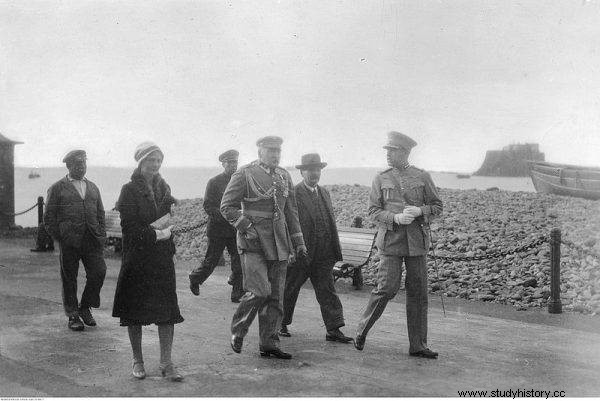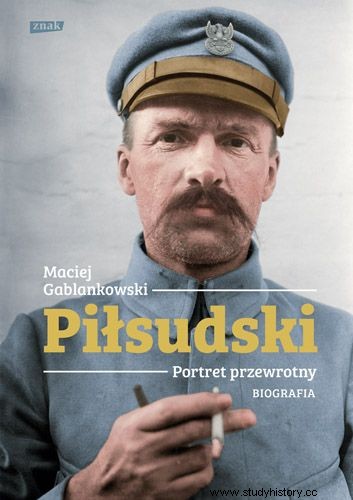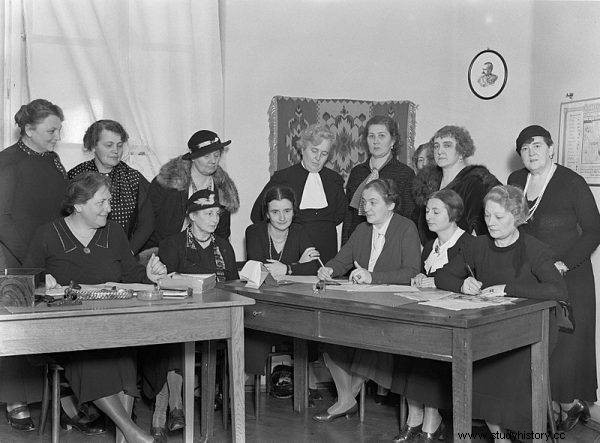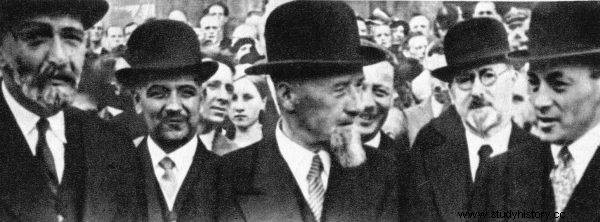The best specialists did not know this name. The dates 1931–1934 were also electrifying. This period in the life of the Marshal was considered to be free from romance - the last was to be a relationship with Eugenia Lewicka, which ended with the woman's suicide. And here is such a surprise! This allegedly more and more infirm grandfather had a lover at the end of his life? It changed everything that was known about Józef Piłsudski.
April 1995 did not promise anything exciting. The political crisis of March has been resolved. The premiership of Waldemar Pawlak was just a memory, and Józef Oleksy only held his post for the second month and has not yet had time to show anything characteristic. The first metro line from Kabaty to the University of Technology was opened in Warsaw. Poles were still learning to use new coins and banknotes when their attention was caught by the tragic gas explosion in the Gdańsk block of flats, which killed 22 people.
But it was a hot day for collectors of Józef Piłsudski memorabilia. An exciting item was just entering the auction at the private auction house Unicum. "J. Piłsudski, Love letters to Jadwiga Burhardt ”. Even the greatest experts rubbed their eyes in amazement. Love letters to whom?
The auction started at 8 million zlotys, ie in new zlotys 800. The amount is not excessive, but for a few letters, however, significant. After a hot auction, the collection of documents was transferred to the National Library, which was intensively expanding its collection of manuscripts. The final price almost five times exceeded the amount from which the auction started. A glance at the contents of the letters announced that it was a good buy. The details of the Marshal's recent romance turned out to be a delicious sensation.
Dear Dzidz!
“… And on the same Friday, please wait for me at home around 6 pm [in the afternoon]. Kiss the hands with an apology. J. Piłsudski ”- a scrap of a card dated May 3, 1931 is intriguing. Evidently, the author's accounts have a story. It is all the more significant as Piłsudski returned from Madeira just a month earlier.
He went there officially with a very limited delegation of two - a doctor and aide - and unofficially three:a doctor, aide and a mistress. A lover - young, beautiful and full of energy Eugenia Lewicka was just in the biggest hole of her life. The romance with the Marshal, even if it ended in Madeira, had far-reaching consequences for her.
Aleksandra Piłsudska - the Marshal's wife and mother of his two daughters - did not intend to passively watch as her younger competitor steals her husband. Especially that she had practiced this scenario herself several years earlier, when Józef Piłsudski was still married to Maria Juszkiewicz.

Piłsudski with Lewicka in Madeira
There was a confrontation with her husband's favorite, and Aleksandra used all her influence to make Eugenia Lewicka's life difficult. And she did it so effectively that she - deprived of a job and prospects - committed suicide. Devastated Piłsudski appeared at Lewicka's funeral and, sighing heavily, said:"I was not spared even that". And here are such happy notes!
At the beginning of July, Piłsudski writes “Dear Dzidzi. After returning from the village, I found a very nice gift that I liked very much. It will come in handy for an ottoman. An ottoman is a type of soft-lined sofa with one side. And "Dear Dzidzi" is Jadwiga Buhardt. Piłsudski expresses his heartfelt greetings.

The text is based on the latest book by Maciej Gablankowski, "Piłsudski. A perverse portrait. Biography ", which has just been released by the Znak publishing house.
Dzidzi probably had some financial problems, because in the next letter, Piłsudski announced his support for his beloved, asking for the address to which he would send the money:"because I will have to send you money and I will not know where". Dzidzi also has - it seems - some health problems:"I hope that Truskavets will serve you well for stones, because Naftusia [the most famous spring water in this spa - ed. aut.] is famous for that ”.
By the way, we get to know Piłsudski from an unknown side. From Druskininkai he writes:“The season ends here. The musician has already left for a few days and it is very quiet in the park. " Or "Ask Mr. Ing. R. how much his radio apparatus cost him. I like it very much. In my opinion, it is better than many other factory products. " We knew that Piłsudski was interested in military communications, but the interest in music and radio design for private use is a complete novelty. In a word:these few pages turned our ideas about the last, supposedly quiet years of the Marshal's life upside down. The National Library made a great deal of buying this manuscript.
Woman with pearls
The collection included a poor quality portrait of a tastefully dressed woman, somewhere in her thirties, with a triple string of pearls. They draw attention to the mocking look and gently smiling pursed lips. As if the portrayed woman wanted to tell us:you will not know my secrets.
And yet, journalistic inquisitiveness overcomes even such barriers. The author of the first press article devoted to Jadwiga Burhadt - Natalia Iwaszkiewicz - found a biography written by her. Dzidzia was born in 1901, when she was dating Piłsudski, she was thirty years old - so the same face looks at us from the photograph that he also saw.
It turns out that Jadwiga was a nurse by profession. She was married for two years, but after her husband's death, she started working as a secretary and practically throughout the 1930s she worked in various office positions. During World War II, she participated in the defense of the capital and, wounded, received a disability pension, which after the war, however, turned out to be insufficient to support herself.

Aleksandra Piłsudska (third from the right in the bottom row) at a meeting of ladies who are part of an organization dealing with the fate of orphans and homeless children, victims of World War I
In search of earning opportunities, she opened a buffet at the railway station in Radomsko, then for some time she was the manager of the canteen at MPK in Warsaw. After a short break in 1960, she was forced to return to work and found employment as a cook at the cafeteria at the Sanatorium im. Julian Marchlewski in Otwock. By a strange coincidence, the sanatorium was nicknamed "Olin", because before the war it was built with the funds of the foundation sponsored by the marshal's wife:Aleksandra Piłsudska . In Otwock in 1965, Jadwiga died, leaving behind a handful of papers that were auctioned 30 years later.
It would seem that Jadwiga and Marshal came from worlds that had no right to meet. And yet - as stated by Natalia Iwaszkiewicz - the authenticity of the letters was even confirmed by Andrzej Garlicki - an outstanding expert on Józef Piłsudski and the author of his biography.
Find out more:Piłsudski's most controversial order
Doubts
On the article by Natalia Iwaszkiewicz, the matter seemed a sealed one. J. Piłsudski from the letters is Józef Piłsudski. End and period. And yet doubts began to multiply. Certain details from the letters reprinted in the journal "Wprost" attracted the attention of Professor Andrzej Ajnenkiel - an outstanding historian of law.
In a long letter, professor Ajnenkiel asks what is this bank where this J. Piłsudski is to appear? What these - mentioned in one of the letters - "first days in office" would be "very difficult" for Józef Piłsudski. And finally, who would dare to order the Marshal to participate in the "conference of ministers".
This J. Piłsudski from the letters is certainly not Józef Piłsudski, but Jan, Józef's younger brother, writes professor Ajnenkiel. At that time, he worked in a bank, was an MP, and in 1931 he became the Minister of the Treasury. Everything is correct. Well, but Andrzej Garlicki's opinion remains that this is the authentic writing of Józef Piłsudski. Here, Ajnenkiel also raises doubts.

Most likely the author of the letters was not Józef but Jan Piłsudski (second from the right)
The character is indeed a bit similar, but the signature is very different. And on one of the cards to Dzidzia it almost clearly reads Jan Piłsudski, not Józef. The way of connecting the letter "J" to the surname is also different than the one used by Joseph. In his captions, "J" and "P" were connected high, and the hand first drew the belly, and only then a vertical line. In letters to Jadwiga, the hand connected "J" with "P" at the bottom and drew a vertical line first, and only then the "belly". So was Andrzej Garlicki wrong?
The matter is settled many years later, when Andrzej Garlicki talks with the publisher of his biography and the author of this article:when I asked him whether Jadwiga should be mentioned in the preface to the new edition, he replied:Joseph ”.
So did Marshal Piłsudski never have an affair with the buffet? Fortunately, history comes to the rescue of gastronomy workers. Well, Aleksandra Szczerbińska (later Piłsudska) during the First World War and immediately afterwards worked in a diner for the poorest. The distinguished Marshal, undoubtedly the love of Józef Piłsudski's life, was therefore also ... buffet.
The text is based on the latest book by Maciej Gablankowski, "Piłsudski. A perverse portrait. Biography ", which has just been released by the Znak publishing house.
Acknowledgment from the author:Thank you very much to the National Library for making the microfilm available in the difficult times of the pandemic.
